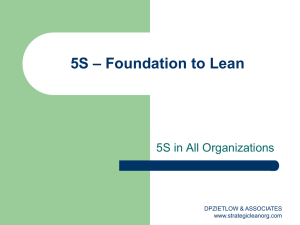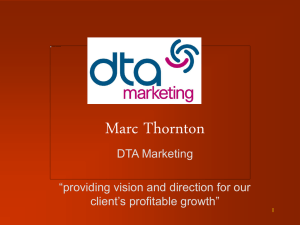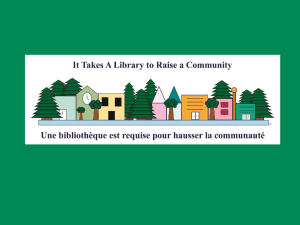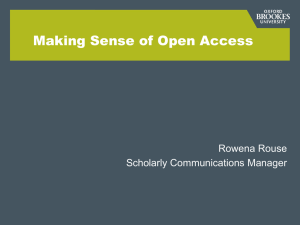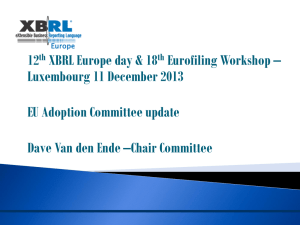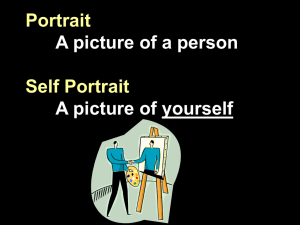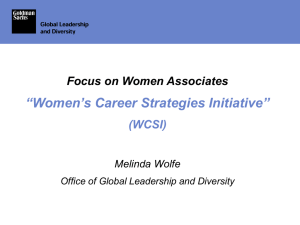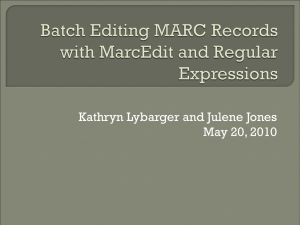Using Discovery to Improve Transition Outcomes Finding
advertisement
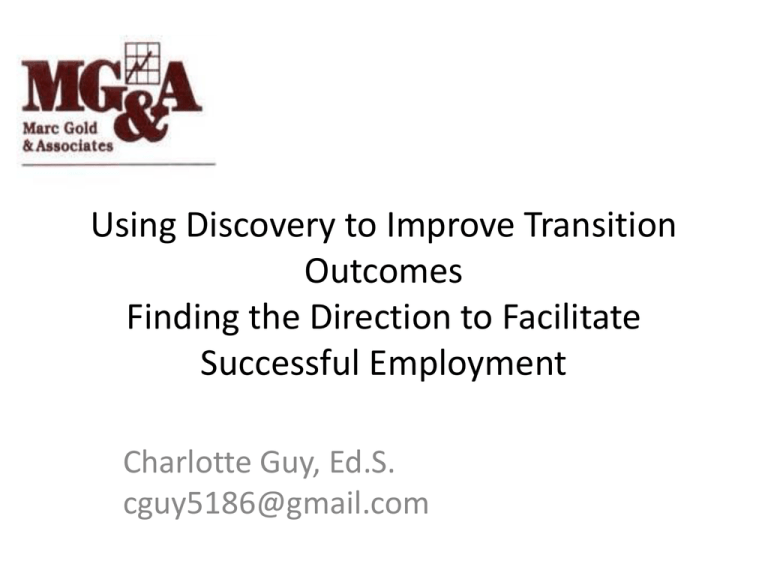
Using Discovery to Improve Transition Outcomes Finding the Direction to Facilitate Successful Employment Charlotte Guy, Ed.S. cguy5186@gmail.com As a Result of Morning Session you will be able to: • Distinguish how Discovery is different from traditional assessment procedures • Identify the components of an effective transition planning system • Identify the strategies to gather information in discovery • Gain an understanding of the Customized Employment Process Marc Gold & Associates© 2 As a result of the afternoon session you will be able to: • Create job development plans for students using Discovery to guide a career plan • Develop a coordinated set of vocational transition activities • Explain the importance of work experiences, internships and paid employment Marc Gold & Associates© 3 Transition Planning Process involves accommodating a change status of interdependence of being a student to taking on more independent adult roles within and external to the family. Marc Gold & Associates© 4 Transition Services Includes a coordinated set of activities designed to facilitate students move out of school and into community living, employment, post-school education, or more independent living. Marc Gold & Associates© 5 Mandate requires LEA: 1. Provide transition services for every child with a disability 2. Develop a “coordinated set of activities” 3. Coordinate transition activities with community service agencies 4. Consider individual needs, strengths, preferences, and interests Marc Gold & Associates© 6 Components of Effective Transition Planning System • Education programs must be designed to prepare students to live and work in the community • Postsecondary services must be available to develop and achieve a lifestyle reflects students own needs and preferences • Education and community service agencies work collaboratively achieve post-school outcomes for each student Marc Gold & Associates© 7 Creating an Employment Transition Pathway What do you want to be??? What do you want to be when you grow up? VIDEO •A Doctor •Big Thor •Princess •Civil Engineer •A mommy •Hercules The Discovery Process Age Appropriate Transition Assessment Transition Assessment “…ongoing process of collecting data on the individual’s needs, preferences and interests as they relate to the demands of current and future working, educational, living and personal and social environments.” Marc Gold & Associates© 13 Transition Assessment • • • • Obtained over time Indicate strengths, preferences and interests Consider present and future environment Conducted by way of multiple places, sources, and or persons • Be sensitive to cultural diversity Marc Gold & Associates© 14 Approach to Traditional Assessment Traditional Assessment • Measured readiness in unfamiliar and often times artificial environments, • Compared production and performance of people with disabilities to others, or to standardized norms, • Typically highlight deficits of people with significant disabilities What does Traditional Approaches to Assessment Tell Us? • Attempts to answer the question whether or not the student can work • What the student can and can’t do • Determines the specific job or career path the student should pursue • Leads the student into a competitive process and narrows the field of potential jobs THE DISCOVERY PROCES IS A MEANS TO: • MEET IDEA 2004 legal requirements to assess students and develop transition plans • Assist with Indicator 13 compliance and, most importantly • Provide a method of assessment without anxiety and bias Discovery The process of gathering information about a person for the purposes of: • Planning relevant curriculum • Identifying necessary skills to be taught • Developing IEP goals • Gathering information for eventual job development Discovery Process Methods • Developmentally age-appropriate • Focused on abilities and contributions rather than disabilities and deficits Who is James? Why Do Discovery? •To understand how the student’s disability impacts their life •To identify what supports are needed in order for the student to be successful •To develop a support plan •To identify the student’s interest and contributions A Resource for Discovery This manual on Discovery and it’s companion for Profiles are available from MG&A. Phone number below. Marc Gold & Associates© 23 Customized Process • • • • • Discovery Capturing discovery through profiles Customized, person-centered planning Portfolio/visual resume development Job development and negotiation Here, CE dovetails with Supported Employment • Job site analysis, accommodations, support Marc Gold & Associates© 24 The essence of discovery Discovery: to gain insight or knowledge of something previously unseen or unknown; to notice or realize; to make known, reveal, disclose Marc Gold & Associates© 25 The Iceberg Analogy of Discovery What we usually know about the people we try to assist – just the tip of the iceberg We need to know much more Marc Gold & Associates© 26 The role of discovery Discovery provides, in a non-traditional, common-sense form, the information needed to determine the strengths, needs, and interests* of any person with complex life issues. This is accomplished by simply addressing the question, “Who is this person?” * From DOL/ODEP definition Marc Gold & Associates© 27 The focus of discovery • Conditions for Success • Interests toward an aspect of the Labor Market • Potential Contributions to Employers Characteristics of an Ideal Job Conditions are characteristics of any job developed for the individual. Conditions refer to issues such as days of work, pay, benefits, location of the job, inside/outside work, time of day, hours per week, etc. While it is possible to have too many conditions, these are extremely important considerations in customizing a job. Target go/no go conditions for priority consideration. Marc Gold & Associates 29 Sadie’s Conditions for Employment: Morning hours No later than 4:00 PM 4 – 5 hours per day 3 days/week during school 5 days/week after school Mon. – Fri. /1 Sat. and Sun. per month 15 mile radius from home Inside, air conditioned Job has routines Natural supports available Sitting for most of work Organized workplace that uses lists for duties Marc Gold & Associates 30 Characteristics of an Ideal Job Interests are characteristics of an ideal job that gives direction toward a certain area of work interest. These should be stated in the broadest possible manner, allowable by the applicant. Interests might include: working around boats, office work or working in a retail setting. Do not confuse work preferences with preferentially-stated conditions. Avoid using job titles. Marc Gold & Associates 31 Sadie’s Interest Areas: Office Work Food Services Retail Services ______________________ ______________________ This area will typically be the smallest in terms of number of characteristics listed. Marc Gold & Associates 32 Characteristics of an Ideal Job Contributions refer to the individual’s characteristics that will be offered to employers. These might include: Personality characteristics Skills Credentials Experiences Recommendations Marc Gold & Associates 33 Sadie’s Contributions: Personality Characteristics Very organized (Sadie takes care of all her clothes, ironing and laundry) Great memory (Sadie remembers the birthdays, meeting times and license plate renewal for all family members) Dry, sharp sense of humor Fun loving person Marc Gold & Associates 34 Sadie’s Contributions: Skills Follows written schedule Follows multi-step directions Stays on task Contributions: Experiences Worked on Senior yearbook staff, NHS Volunteered at church child care center Sorts mail for all teachers at NHS Contributions: Recommendations Mr. Gibson, school principal Marc Gold & Associates 35 35 Discovery and Customization These are compatible concepts that are used sequentially to facilitate employment for students who might otherwise not achieve employment. Discovery provides the foundation information for individuals that is then used to customize a position with an employer. Marc Gold & Associates© 36 We are all like pieces in a complex jig-saw puzzle Educators Self-concept Parents Old friends Close friends Co-workers Extended family/relatives Siblings Professionals in our lives Who is this person? Community members Discovery finds the pieces and puts them together This is who I am. Discovery and Traditional Procedures • Discovery seeks to identify already-existing information rather than developing information solely for the purposes of evaluation or diagnosis. • Identifying a direction for employment is based on a translation of typical activities of the person’s life rather than on a comparison of the individual with others or with standards. Marc Gold & Associates© 39 Discovery and Traditional Procedures • The discovery process focuses more on ecological validity than predictive validity. It is more important that the direction to employment makes sense in relation to a person's life than to attempt to predict success based on test performance. • The information of discovery is used only as a guide for matching and customization and may not used to systematically exclude a person from employment. Marc Gold & Associates© 40 Discovery and Traditional Procedures • By implementing discovery, we try to identify the real complexities faced by the individual and attempt to negotiate and match employment that fits, rather than putting the burden of resolving complexities solely on the individual. • The profile strategy seeks to empower and involve applicants, their families and friends rather than to exclude them. Natural, common sense approaches to employment are given priority over strategies which rely solely on professional judgment and service. Marc Gold & Associates© 41 Need for Discovery • Discovery is often assumed, we think “what we see is what they’ve got.” • Information on an individual is often disjointed, different people have different parts of the “puzzle.” Marc Gold & Associates© 42 Marc Gold & Associates© 43 Need for Discovery Complexity is like a fog, obscuring the best of who people are. – Discovery shows us the impact of life complexity on work. – When we discover rather than presume and diagnose, a useful description of a person starts to emerge. – Discovery shows possibilities and leads to things a person is motivated to do rather than to fears, negativity and deficits. Marc Gold & Associates© 44 Meet Andrew in High School Andy was a typical young person with a disability Marc Gold & Associates© 45 The school’s view of Andy At eighteen years old, he was still viewed as a young child who was not “ready” to enter into a life as an employed adult Marc Gold & Associates© 46 Testing results… • “able to remain focused for approx. 30 minutes” • “he would say ‘too hard’ and cease work” • Reading Comp: 1.6 grade level • SRA non-verbal reasoning test: 4th percentile Marc Gold & Associates© 47 • Minn. Clerical test: 1st percentile, timed & untimed • WREST: “very poor range in all areas” • Productivity rate 6% • On work samples: “accuracy improved very slowly with practice and constant one-one supervision” The negative impression of testing “Relative to all work samples administered, it appeared that Mr. Cosel’s performance was best when tasks involved no more than one or two steps.” “Due to Mr. Cosel’s very low level of productivity and his need for constant supervision, traditional employment is not feasible at this time. Training and education which enables him to practice simple manual skills such as packaging and sorting should be explored in the future.” Marc Gold & Associates© 48 Beyond the Presumptions of Evaluation In order to find an optimistic path towards employment, in light of poor test performance and low expectations, it was necessary to get to know Andy much more deeply than who he seemed to be those who knew him professionally. Marc Gold & Associates© 49 Discovery provided a new picture of Andy Marc Gold & Associates© 50 New dimensions of his personality, skills and interests His pastime activities gave us insight into skills that the tests did not identify Marc Gold & Associates© 51 Andy’s hobbies and interests gave perspective to his overall character From Computers To musical interests… Marc Gold & Associates© 52 Getting personal From bathing… To toileting accommodations Marc Gold & Associates© 53 Family and friends Marc Gold & Associates© 54 Support from his service dog Marc Gold & Associates© 55 Employment experiences Delivering cash receipts Assisting warehouse personnel Marc Gold & Associates© 56 Importance of Discovery Facilitated Discovery provided a clear, alternative picture of Andy. It provided sufficient information and direction to develop a plan for customized job development. Andy started work at teaching hospital at SUNY Stoney Brook on Long Island after job development by his family. Marc Gold & Associates© 57 Andy is responsible for delivery of data processing information to 82 departs. within the hospital Marc Gold & Associates© 58 Still working… Andy is still working today, fifteen years later. Marc Gold & Associates© 59 And still painting… Marc Gold & Associates© 60 Discovery is… • A process that involves getting to know people, or helping them get to know themselves, before we help them plan • Spending time with applicants, instead of testing or evaluating them, as a means of finding out who they are • The best way to find out the best that people have to offer • A common-sense strategy to determine complexities and preferences Marc Gold & Associates© 61 Discovery is… • A way to identify the unique contributions offered by those who might not compete as well as others • Enhanced when we get to know people in settings where they are most who they are • Not a plan, but the foundation of employment planning, that seeks to customize outcomes • Compatible with self-determination and customer choice Marc Gold & Associates© 62 Discovery = Translation The finesse of discovery is to identify typical aspects of life and to translate those activities into Conditions for success, Interests toward employment and potential Contributions to be offered to employers. Discovery is essentially an activity of translation. Skills of Life > Potential Work Tasks Current Skills of Life refer to any performance activity that the individual currently performs without support or with support, as described in notes. Potential Work Tasks refer to current skills of life, translated into employer language, that the person can reasonably be expected to perform at work, with training, supports and accommodations as necessary. Marc Gold & Associates 64 Discovery allows us to determine who the applicant is, their complexities, and potential contributions to employers. Education Responsibilities Hobbies Discovery Process Interest Areas Complexities Transportation Self-Image Marc Gold & Associates© 65 Challenges Skills Approaches to Discovery Discovery can either be: 1. Facilitated by someone else, typically an employment professional Who is he? Marc Gold & Associates© 66 Approaches to Discovery 2. Part of a group experience Marc Gold & Associates© 67 Approaches to Discovery 3. Accomplished through “self-discovery” Who am I? Individuals can “paint” their own picture of who they are. Marc Gold & Associates© 68 Approaches to Discovery 4. Supported through “Coached” Discovery Self-discovery Involves assisting an individual through both self and group discovery “Coach” Group discovery Marc Gold & Associates© 69 Let’s Experience Discovery: Ask your partner… 1) What skill or talent do you have that most people don’t know about? 2) Where/when are you at your best? 3) Where/when are you at your worst? 4) Other than spouse/parents/partner/ kids, who would you like to give information about you? 5) What event(s) most shaped your life? Marc Gold & Associates© 70
